|
|
|
Sort Order |
|
|
|
Items / Page
|
|
|
|
|
|
|
| Srl | Item |
| 1 |
ID:
193209
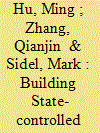

|
|
|
|
|
| Summary/Abstract |
The dominant role of the authoritarian state in Chinese volunteerism has been noted but little examined in the scholarly literature. This study illuminates the ways in which the Chinese state controls and administers volunteerism and volunteering through a detailed analysis of the governance of volunteering in Beijing. Drawing on participant observation, interviews and archival research, we analyse how Beijing administers volunteering and its structures through the work of its administrative authority for managing volunteering in regulation and public policy, management structure, resources, internal operations, monitoring and evaluation. We argue that Beijing has built a comprehensive apparatus to manage and control volunteering through a Party- and state-controlled, multi-layered and centralized management structure. However, this state corporatist structure carries within it the seeds for over-formal controls and conflicts between official, professional service providers and the increasing number of volunteers throughout Chinese society.
|
|
|
|
|
|
|
|
|
|
|
|
|
|
|
|
| 2 |
ID:
073382
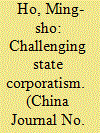

|
|
|
|
|
| Publication |
2006.
|
| Summary/Abstract |
This paper traces the post-authoritarian development of state-labor relations in Taiwan by focusing on the union federation movement (1994-2004). Since the late 1980s, Taiwan's labor movement has sought to challenge state-corporatist control, in the sense of representative monopoly by a conservative national federation. Owing to legal restrictions and the availability of support from the Opposition, Taiwan's labor movement opted for the strategy of political alignment rather than building organizational basis. Close cooperation with Opposition élites enabled the labor movement to bend the iron bars of state corporatism with a relatively weak organizational basis. With the legalization of the Taiwan Confederation of Trade Unions in 2000, industrial labor finally acquired an institutional position within the political system and was able to promote labor reforms. Nevertheless, the TCTU remained organizationally fragile, financially weak and faction-ridden as a result of the political alignment strategy. Consequently, the demise of state corporatism ended the labor federation movement, rather than ushering in a new era of societal corporatism.
|
|
|
|
|
|
|
|
|
|
|
|
|
|
|
|
| 3 |
ID:
163449
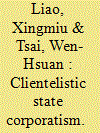

|
|
|
|
|
| Summary/Abstract |
United front work has played an important role in the history of the
Chinese Communist Party (CCP). Since 2012, Xi Jinping has strengthened the united front system’s e�cacy and further proposed formation
of a “great united front.” He holds that united front work’s essence is
“making friends,” in which regard the CCP under Xi has introduced a
new practice called “pairing-up.” It stipulates that local governments at
all levels must facilitate establishment of “friendly” relations between
members of Party committees and specific persons in charge of
so-called democratic parties to further implementation of united front
work. This new form of united front embodies “clientelistic state
corporatism.” We use the case of L City to analyze the united front
model of pairing-up, its e�ects and limitations, and the CCP’s social
control strategy
|
|
|
|
|
|
|
|
|
|
|
|
|
|
|
|
| 4 |
ID:
113894
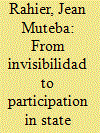

|
|
|
|
|
| Publication |
2011.
|
| Summary/Abstract |
In this article I briefly discuss the process that led in 1998 to the first Ecuadorian Constitution to adopt multiculturalism as a fundamental principle in its description of the nation and that for the first time gave special collective rights to Indigenous peoples and, in a less obvious way, to Afro-Ecuadorians. I then discuss some of the processes by which the second multicultural Constitution was adopted in 2008 in Ciudad Alfaro by a Constituent Assembly dominated by the party Alianza País, founded by the current President, Rafael Correa, a proponent of "21st century socialism." My discussions are done with the objective of commenting on the Afro-Ecuadorian activism and political organizing that took place since the late 1970s and also right before or, for the 2008 Constitution, during the actual processes of constitutional writing. I discuss Afro-Ecuadorian participation in corporatism, which mostly developed since the end of the 1990s along with the corporatist integration of other sectors of Ecuadorian society, including Indigenous groups and workers' unions. I show that Afro-Ecuadorian influences on, and participation in, the process that led to the adoption of the 2008 Constitution was in fact corporatist. I conclude that if it is true that current corporatist practices and the existence of the CODAE make it more difficult to represent and theorize Afro-Ecuadorians as the country's "ultimate Others," particularly when considering the rather successful Afro-Ecuadorian participation in the 2008 Constitutional processes, it is not less true that Ecuadorian civil society still has a long way to go to end its long history of anti-black racism.
|
|
|
|
|
|
|
|
|
|
|
|
|
|
|
|
| 5 |
ID:
159182
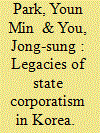

|
|
|
|
|
| Summary/Abstract |
Regarding the causes of the Sewol ferry accident that claimed 304 lives in April 2014, some scholars have blamed neoliberal reforms such as deregulation and privatization for the safety regulatory failure. Others have highlighted the role of industry influence and corruption. Our analysis shows that regulatory capture was the crucial causal factor; moreover, this capture was institutionalized from the state-corporatist arrangements of the authoritarian period rather than reflecting new arrangements under the democratic era or corruption per se. The delegation of the critical safety regulation enforcement to the shipping industry association was not introduced as a neoliberal reform but in the context of state corporatism of the Park Chung-hee regime. Democratic governments continued to protect the monopoly of the lucrative Incheon–Jeju ferry business, contrary to neoliberal logic. The legacies of state corporatism persist despite post-financial crisis reform.
|
|
|
|
|
|
|
|
|
|
|
|
|
|
|
|
|
|
|
|
|